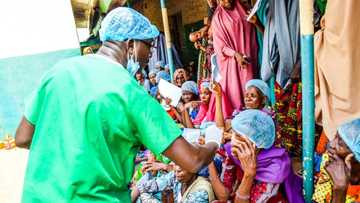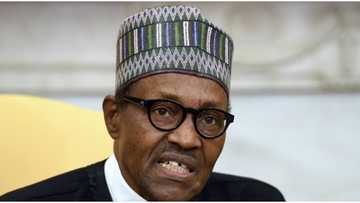CSOs Call for Institutionalisation of Cancer Screening in Primary Health Centres
- The first lady of Niger state Dr Amina Bello has called for the establishment of cancer screening centres in communities
- Dr Bello said taking screening to primary health care centres will increase early detection and treatment of the disease in women
- According to the first lady of Niger state, the burden of the cost of detection and treatment should be lifted from women
PAY ATTENTION: Join Legit.ng Telegram channel! Never miss important updates!
FCT, Abuja - Civil society organisations, First Ladies against Cancer (FLAC) and Roche Nigeria on Tuesday, June 1, called for the institutionalisation of cancer screening in primary health care centres across Nigeria.
The organisations said it is important that cancer screenings are done in every PHC as they are the closest centres to Nigerians at the community level.
Speaking at a virtual briefing attended by Legit.ng, the first lady of Niger state and chairperson of FLAC, Amina Bello, said breast and cervical cancer are the most common causes of female cancer-related mortality in the country.
She said once cancer screening centres are activated at the community level which is the PHCs, there would be a significant decrease in the mortality rate of female affected by the disease.
Dr Bello said:
"This is because cancer treatments are very expensive and over 75 per cent of Nigerians pay for health care out of pocket.
"This is a huge burden on the resource of the average Nigerian. Prevention and early detection of cancer not only improves chances of survival and reduces morbidity, but it also reduces the financial burden associated with the cost of treatment."
The Niger state first lady institutionalizing cancer centres at PHCs and clinics can also be used to eliminate both the economic and cultural barriers that may exist.
Dr Bello also said that efforts have been made in the past to create cancer-detection treatment awareness however, these moves have not completely improved the cancer health behaviour amongst women in Nigeria.
PAY ATTENTION: Install our latest app for Android, read best news on Nigeria’s #1 news app
She said the with the high cost of treatment and detection of the disease, efforts should be made to lift such a burden for women.
Describing the screening of cancer as a requisite test, Dr Bello said it is compulsory for women to undertake such an exercise.

Source: Twitter
She said:
"Some other factors affecting women’s resistance to cancer screening include low perception of cancer risk and physician gender preferences.
"In addition, lack of spouse permission and support; belief that cancer is a death wish and societal discrimination is amongst the common socio-cultural barriers to screening.
"It is therefore imperative that stakeholders upscale efforts to advocate for and create awareness of cancer screening available to Nigerian women."
Ms Bello also said that having a national screening programme for cervical cancer will key into the recently launched WHO cervical cancer elimination strategy, which involves screening and treatment of cervical cancer as well as the prevention with Human Papilloma Virus (HPV) vaccination.

Read also
Friends of Osinbajo sponsor free eye surgeries in Ogun state, to conduct 6000 across Nigeria
She said the HPV vaccines are only available to those who can afford them, which brings the need to incorporate the vaccine into the National vaccination program.
Dr Bello said:
“We are also advocating for the HPV vaccines to be given to our girls to prevent more cancer cases."
Also speaking, the general manager of Roche Nigeria, Ladi Hameed, said the organisation has specifically paved the way to provide breast cancer treatment to women in some states across the country.
Hameed said efforts are ongoing to create awareness amongst women about the importance of vaccination, screening and treatment.
He said:
“For both breast and cervical cancers, the screening tests are simple and relatively inexpensive and can easily be provided at primary health centres."
He called on the Nigerian government and other stakeholders alike to join effort towards meeting the objective target of 90 per cent of girls to be vaccinated against HPV by 2030, 70 per cent of women screened for HPV by the age of 35 and then again at 45 years of age and lastly that 90 per cent of women diagnosed with cervical cancer are able to access treatment.
Meanwhile, Legit.ng previously reported that a teenage girl simply identified as Queen on microblogging site, Twitter celebrated her life at 14 after defeating the deadly cancer disease.
Queen announced to her followers on the social media platform that she has beat the disease hands-down leading to the flooding of her mentions with congratulatory comments by her followers.
According to the teenager, when she was diagnosed with lymphoma by doctors, many people thought that would be the end of her life.
Also, in a campaign towards the fight against a nine-year-old boy who had never cut his hair before did so in support of cancer patients.
The boy said he who said he was growing his hair to look like his mentor Gareth Bale, said the gesture was carried out to create awareness for the fight against cancer.
Source: Legit.ng




